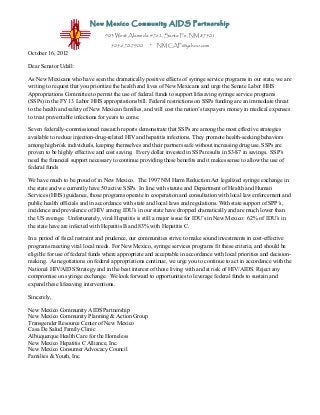
consortium udall letter
- 1. New Mexico Community AIDS Partnership 903 West Alameda #762, Santa Fe, NM 87501 505.670-7900 * NMCAP@yahoo.com October 16, 2012 Dear Senator Udall: As New Mexicans who have seen the dramatically positive effects of syringe service programs in our state, we are writing to request that you prioritize the health and lives of New Mexicans and urge the Senate Labor HHS Appropriations Committee to permit the use of federal funds to support lifesaving syringe service programs (SSPs) in the FY 13 Labor HHS appropriations bill. Federal restrictions on SSPs funding are an immediate threat to the health and safety of New Mexican families, and will cost the nation’s taxpayers money in medical expenses to treat preventable infections for years to come. Seven federally-commissioned research reports demonstrate that SSPs are among the most effective strategies available to reduce injection-drug-related HIV and hepatitis infections. They promote health-seeking behaviors among high-risk individuals, keeping themselves and their partners safe without increasing drug use. SSPs are proven to be highly effective and cost saving. Every dollar invested in SSPs results in $3-$7 in savings. SSP’s need the financial support necessary to continue providing these benefits and it makes sense to allow the use of federal funds We have much to be proud of in New Mexico. The 1997 NM Harm Reduction Act legalized syringe exchange in the state and we currently have 50 active SSPs. In line with statute and Department of Health and Human Services (HHS) guidance, those programs operate in cooperation and consultation with local law enforcement and public health officials and in accordance with state and local laws and regulations. With state support of SPP’s, incidence and prevalence of HIV among IDU’s in our state have dropped dramatically and are much lower than the US average. Unfortunately, viral Hepatitis is still a major issue for IDU’s in New Mexico: 62% of IDU’s in the state have are infected with Hepatitis B and 83% with Hepatitis C. In a period of fiscal restraint and prudence, our communities strive to make sound investments in cost-effective programs meeting vital local needs. For New Mexico, syringe services programs fit these criteria, and should be eligible for use of federal funds where appropriate and acceptable in accordance with local priorities and decision- making. As negotiations on federal appropriations continue, we urge you to continue to act in accordance with the National HIV/AIDS Strategy and in the best interest of those living with and at risk of HIV/AIDS. Reject any compromise on syringe exchange. We look forward to opportunities to leverage federal funds to sustain and expand these lifesaving interventions. Sincerely, New Mexico Community AIDS Partnership New Mexico Community Planning & Action Group Transgender Resource Center of New Mexico Casa De Salud Family Clinic Albuquerque Health Care for the Homeless New Mexico Hepatitis C Alliance, Inc. New Mexico Consumer Advocacy Council Families & Youth, Inc.